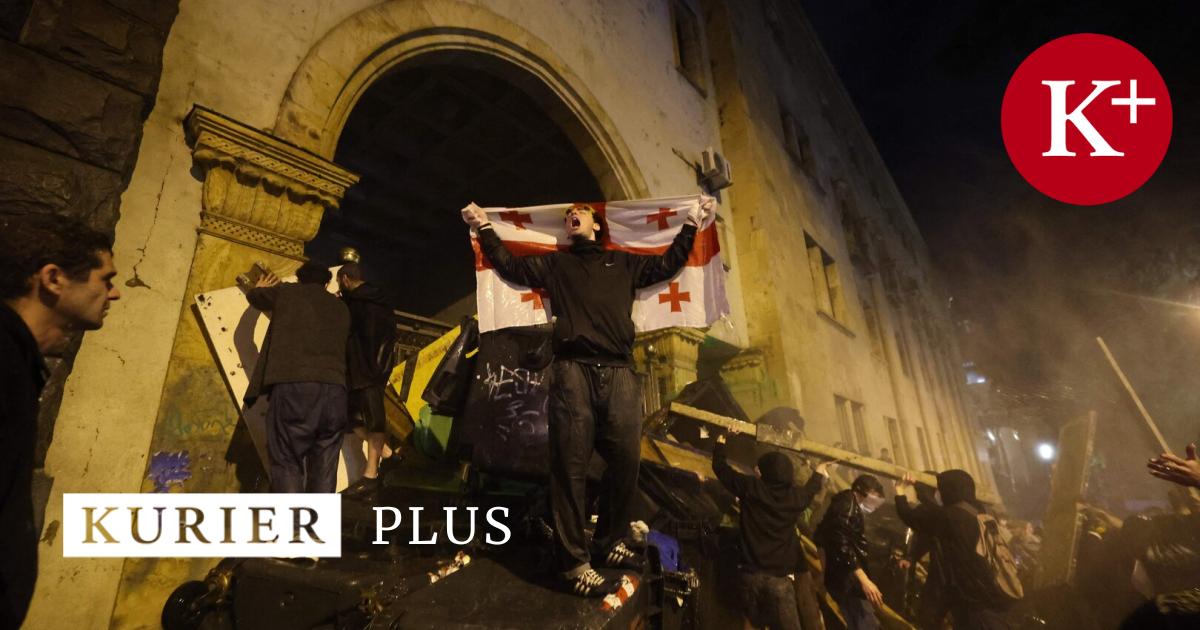20 percent are occupied
Georgia and Russia have long been a complicated story – even more so since Putin sent his tanks to Ukraine. The Caucasus republic with its 3.7 million inhabitants was the first country to use a revolution in 2003 to sweep away the last remnants of the Soviet Union with all its corruption; Ukraine followed just a year later.
This set alarm bells ringing for Putin: the repression in Russia became increasingly massive after the revolutions in the ex-Soviet states, and his expansion policy began with this: in 2008, Russian troops invaded Georgia, the five-day war over the separatist regions of South Ossetia and Abkhazia began. The conflict has not been resolved to this day; 20 percent of the country is considered occupied.
This is also the reason why Georgia has never been able to break free from Moscow’s embrace. Although the country has officially been a candidate for EU membership since last year, it is still extremely dependent on Russia economically. More than 90 percent of wheat comes from there, and Russia is one of the most important export markets, especially for food.
Militaryally isolated
The fear of another attack has never gone away since 2008. This partly has to do with the fact that the country has still not been accepted into NATO, despite the popular desire; Russia’s occupation prevents this. Unlike Ukraine, however, Georgia has extremely poor geographical conditions to defend itself. With the mountains in the north and south, Russia could quickly saw the country in two and put it out of action militarily, and there is no help available from Turkey expect.
Given the situation in Ukraine, the NGO law seems like an advance payment by Tbilisi to avoid being targeted by Moscow. The Georgian leadership is therefore probably speculating that “Russia will gain the upper hand in Ukraine in one way or another and, with increased self-confidence, will also become involved in other neighboring countries,” analyzes Georgia expert Marcel Röthig from the Friedrich Ebert Foundation. They “don’t want to take EU integration too far and, if possible, don’t want to antagonize Moscow.”
EU approval huge
The “Georgian Dream” party, which is behind the law, was once seen as a pioneer towards the EU. But the national-conservative movement, founded in 2012, apparently has its problems with the reform steps demanded by Brussels, the judicial reform and de-oligarchization. This is hardly surprising, since her gray eminence Bidzina Ivanishvili is the richest man in the country – and with a fortune of 6.5 billion dollars, according to Forbes, she is ranked 400th in the world.
Ivanishvili made his fortune in Russia, and he still has excellent contacts there today. It was also he who now launched an all-out attack against the West in order to legitimize his party’s law. In a speech in his luxury palace in Tbilisi, for which special claqueurs were brought in from all over the country – a method that is also known all too well from Moscow – he spoke of a “global war party” that would have decisive influence on NATO and the EU and see Georgia and Ukraine only as cannon fodder. He didn’t make it clear who he meant by that – only this much: “The aim is that no politicians elected by the people administer Georgia, but rather ‘bats’ appointed from outside.”
Quiet criticism from Brussels
In Brussels people are watching all this with suspicion, but so far there hasn’t been too loud criticism. Not even when opposition leader Levan Khabeishvili was severely beaten by special police forces; his face is covered in injuries.
Officially, the EU is threatening to freeze the accession process if the law passes. That wouldn’t be in the interests of the population: According to the latest surveys, almost 90 percent of Georgians are in favor of joining the EU – and 73 percent see Russia as an aggressor.
However, a freeze could play into the government’s hands and the necessary reforms would also be put on hold. And Brussels would be in a quandary – a dilemma that would only play into Putin’s hands.
